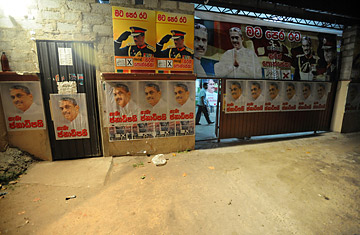
A party worker remains inside the campaign office of Sarath Fonseka in Colombo shortly after he was arrested by the military police on Monday night
General Sarath Fonseka, the defeated candidate in Sri Lanka's recent presidential election, was arrested by military police at his Colombo residence Monday night, Feb. 8. The government said Fonseka, the former army commander, had been arrested on charges of "committing military offenses," but it offered no details. Lakshman Hulugalle, director general of the Media Centre for National Security, told state TV that Fonseka will be court-martialed. No date was given for any possible court appearance.
The government has previously accused Fonseka of organizing a coup and planning to assassinate President Mahinda Rajapaksa and two of his brothers, Defense Secretary Gotabaya Rajapaksa and member of parliament Basil Rajapaksa. Fonseka, who was once a powerful ally of Rajapaksa, led the military campaign that defeated the Tamil separatist insurgency last May. Soon after, he was named Chief of Defence Staff — a move that sidelined him and left him without any effective command. Fonseka later fell out with the Rajapaksa government and put himself forward as the opposition candidate in last month's elections.
Despite predictions that the contest would be a close one, Rajapaksa won by a comfortable 1.8 million votes. But Fonseka did not go quietly. He has accused the government of harassment after the defeat and was meeting with opposition political leaders when military police arrived at his house Monday night. Witnesses at the scene told TIME that Fonseka had informed the military that he wanted police to be present when the arrest was made, but despite his protests, he was taken away by military police.
The arrest follows two weeks of drama that began with Fonseka and his close aides moving into a posh Colombo hotel during the evening of Jan. 26, election day. The hotel was soon surrounded by military. Fonseka complained that there was a threat to his life and that the government was limiting his movements. Authorities claimed that security had been increased around the hotel as a precaution, although several former military officers working on the Fonseka campaign were arrested as they left the hotel. The drama ended late in the evening on Jan. 27 when Fonseka finally left the hotel, although the war of words between the two sides has escalated since.
The government is expected to dissolve parliament in the next few days and call legislative elections. Fonseka had indicated that he would be a candidate and had been negotiating an electoral pact with opposition parties when the arrest took place.
Fonseka's arrest is likely to fuel opposition protests that have remained lukewarm until now. The opposition held a protest rally in Colombo on Feb. 3 in which Fonseka participated. Opposition parties had vowed to continue with protests even before the arrest.
